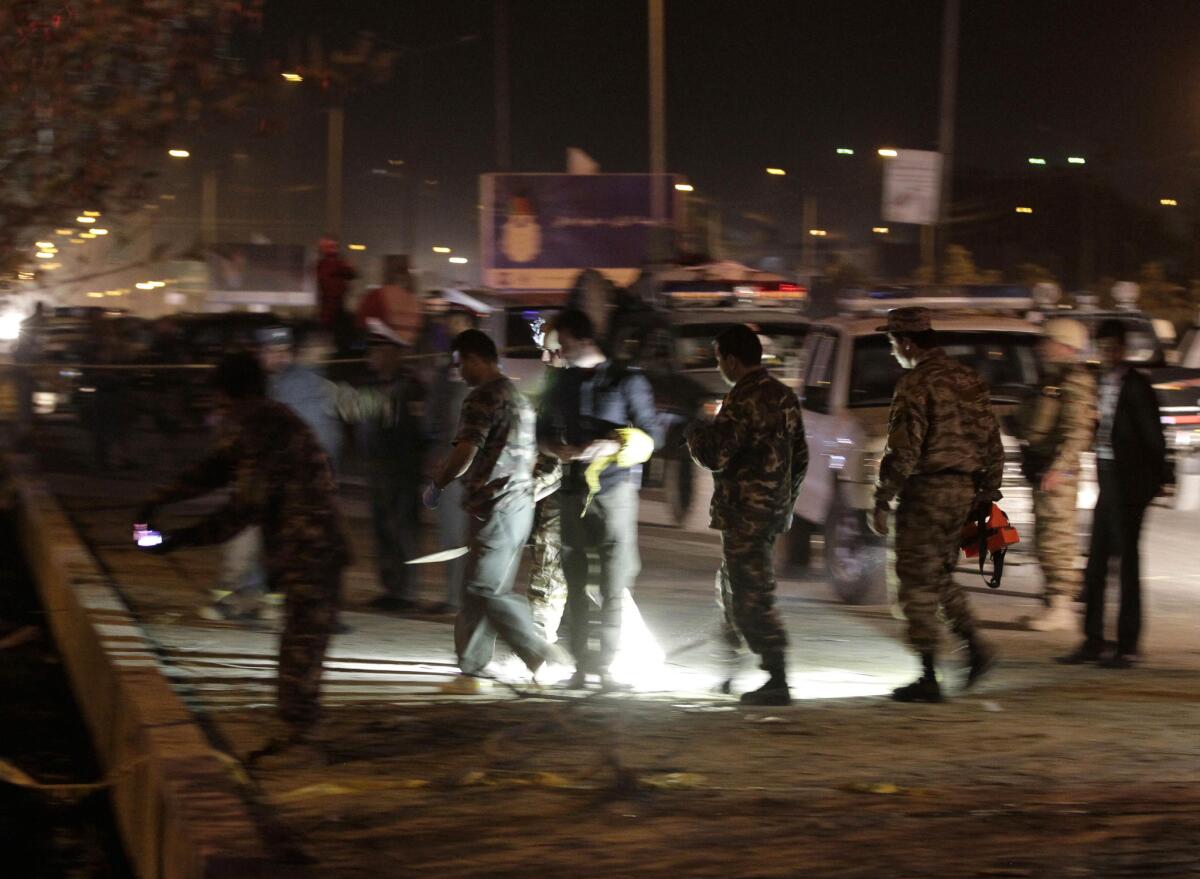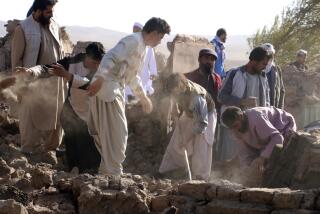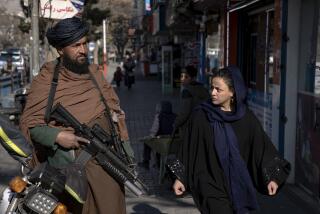Civilians becoming targets in Afghanistan -- a dozen slain by Taliban

- Share via
KABUL, Afghanistan -- The Taliban killed six civilians in Afghanistan, officials said Tuesday, among a dozen slain in the latest attacks that have seen ordinary people increasingly caught up in the violence, often after being accused of working with the government.
The bodies -- four engineers, an adviser and a trainer employed on a project funded by the United Nations -- were discovered Tuesday in Herat province, officials said, an area in the west that’s seen less violence than other parts of Afghanistan. The Taliban claimed responsibility.
This followed by a few hours the discovery of the bodies of six civilians shot in eastern Paktia province.
A civilian was also wounded Tuesday in Kabul when a suicide bomber on a bicycle detonated his explosives near the Energy Ministry after being followed by security forces, city police Chief Mohammad Ayob Salangi said. It wasn’t immediately clear what his intended target was.
In attacking civilians it accuses of supporting the government or foreign troops, analysts said, the Taliban hopes to draw a distinction between itself and the administration of President Hamid Karzai, who it dismisses as a U.S. puppet. This, the movement believes, will force the electorate to reject the government as the Taliban attempts to boost its political standing through violence, intimidation and propaganda in advance of next year’s election and the withdrawal of Western combat troops, they added.
Afghan President Hamid Karzai condemned the killings, suggesting that Pakistan may have had an indirect role, as he wrapped up a two-day visit in that country.
“The killing of innocent engineers and workers shows that the Taliban and their foreign masters want Afghanistan to be an impoverished and underdeveloped country forever,” he said, an apparent reference to foreign powers that include Pakistan. Karzai has frequently accused Pakistan of supporting peace efforts at the same time elements within the country support Afghanistan’s insurgency, part of a dual strategy aimed at expanding its influence in Afghanistan. Islamabad has long denied the allegations.
On Monday, Karzai, in his first visit to Pakistan in 18 months, called on that nation’s help in arranging peace talks with the Taliban. At Pakistani Prime Minister Nawaz Sharif’s request, Karzai prolonged his visit through Tuesday as the two leaders discussed regional security issues. No results were announced, although the meetings included Pakistan’s powerful army chief Gen. Ashfaq Kayani and reportedly focused on more difficult issues between the two countries.
“Pakistan and Afghanistan have to work closely to bring peace in the region,” Sharif said in a statement released by his office. “We have common challenges and huge opportunities before us.”
Mohammad Daud Naemi, spokesman for Afghanistan’s Ministry of Rural Rehabilitation and Development, said the six workers in Herat province were abducted on Sunday while surveying a construction project that aims to improve local project management.
Negotiations had begun toward their release, Naemi said, but their bodies were discovered before a deal was reached. The U.N. operation in Afghanistan condemned the killings, adding that attacks against civilians may amount to war crimes.
The six other slain civilians were found in Paktia province’s Zurmat district. Their identities could not be immediately determined and the bodies were handed over to a Red Cross office in the province, said Rohullah Samon, a spokesman for the provincial governor.
In July, the U.N. reported that the number of civilians killed and wounded combined increased by almost 25% in the first half of this year as Afghan forces assumed more responsibility for security, reversing a decline in 2012 that many hoped would lead to better conditions for the most vulnerable victims of the 12-year war.
In the first six months of this year, 1,319 civilians were killed in war-related violence in Afghanistan, compared with 1,158 in the first half of 2012, with women and children affected disproportionately, according to the report. In addition, 2,533 civilians were injured, compared with 1,976 a year earlier. The worst year on record for civilians was 2011.
The report said the Taliban and other militant groups were responsible for most of the 23% jump in civilian casualties through indiscriminate roadside bombings, armed assaults and suicide attacks in populated areas. But the Taliban, in a statement at the time, condemned the report as “totally biased,” adding that many of those identified as civilians were actually soldiers, police and officials at intelligence agencies.
Jawed Kohistani, a Kabul-based military and political analyst, said he expected abductions and killings to increase because the Taliban increasingly sees kidnapping as a way to raise funds. “The Taliban name is good for business these days,” he said. “And if they don’t get the money, they kill those abducted.”
Rising civilian casualty rates have reinforced concerns that Afghan forces aren’t equipped to take on the militants after foreign troops leave. The Afghan army suffers from poor morale, high desertion rates, weak training, equipment shortfalls and limited medical support.
ALSO:
Quiet pyramids, empty hotels: Egypt unrest takes a toll on tourism
Swiss open voter-approved drive-in ‘sex boxes’ to protect prostitutes
New prayer area at Western Wall sparks protest by female activist group
Twitter: @markmagnier
Special correspondents Hashmat Baktash in Kabul and Nasir Khan in Islamabad contributed to this report.
More to Read
Sign up for Essential California
The most important California stories and recommendations in your inbox every morning.
You may occasionally receive promotional content from the Los Angeles Times.










